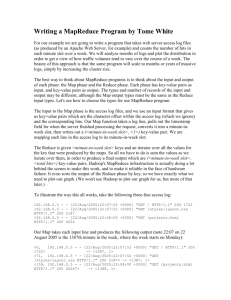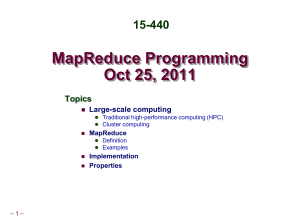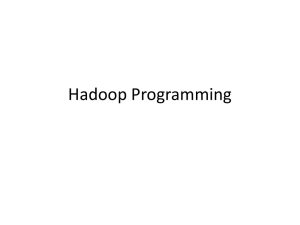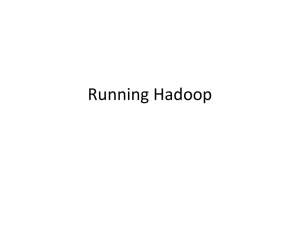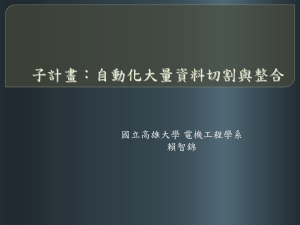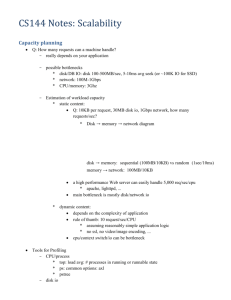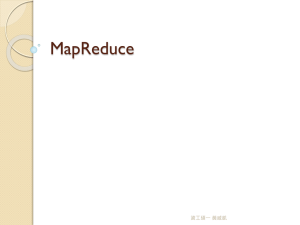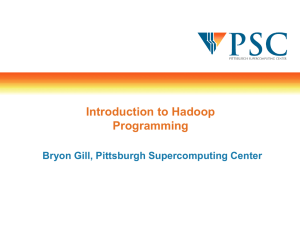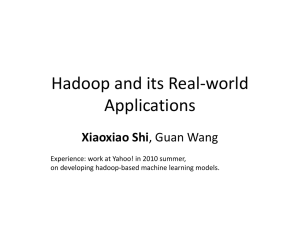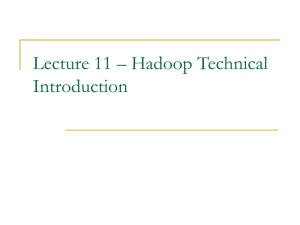CS246 TA Session: Hadoop Tutorial
advertisement
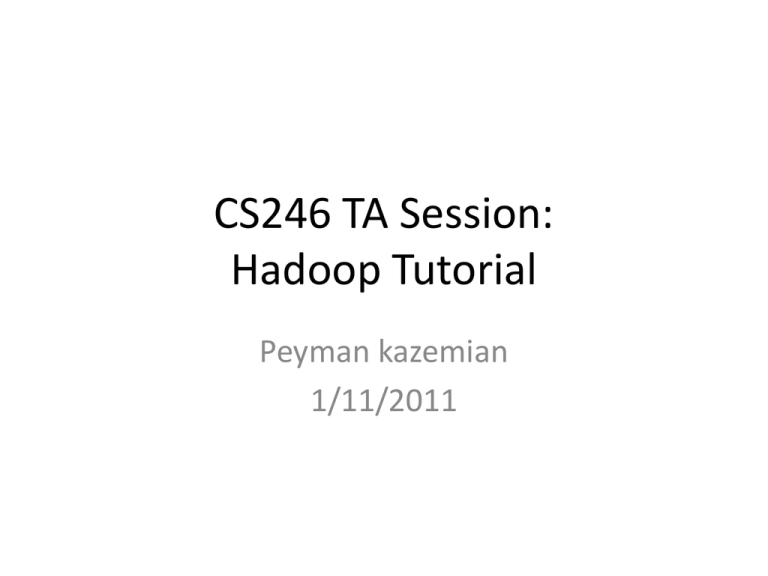
CS246 TA Session:
Hadoop Tutorial
Peyman kazemian
1/11/2011
Hadoop Terminology
• Job: a full program – an execution of a Mapper
and Reducer across data set
• Task: An execution of a mapper or reducer on
a slice of data
• Task Attempt: A particular instance of an
attempt to execute a task on a machine
Hadoop Map Reduce at High Level
Hadoop Map Reduce at High Level
• Master node runs JobTracker instance, which
accepts Job requests from clients
• TaskTracker instances run on slave nodes
• TaskTracker forks separate Java process for task
instances
• MapReduce programs are contained in a Java JAR
file. Running a MapReduce job places these files
into the HDFS and notifies TaskTrackers where to
retrieve the relevant program code
• Data is already in HDFS.
Installing Map Reduce
• Please follow the instructions here:
http://www.stanford.edu/class/cs246/cs246-11mmds/hw_files/hadoop_install.pdf
Tip: Don’t forget to run ssh daemon (Linux) or
activate sharing via ssh (Mac OS X: settings -->
sharing). Also remember to open your firewall
on port 22.
Writing Map Reduce code on Hadoop
• We use Eclipse to write the code.
1) Create a new java project.
2) Add hadoop-version-core.jar as external
archive to your project.
3) Write your source code in a .java file
4) Export JAR file. (File->Export and select JAR
file. Then choose the entire project directory
to export)
Writing Map Reduce code on Hadoop
• Need to implement a ‘Map’ and ‘Reduce’ class. They should
have ‘map’ and ‘reduce’ methods respectively.
void map(WritableComparable key,
Writable value,
OutputCollector output,
Reporter reporter)
Void reduce( WritableComparable key,
Iterator values,
OutputCollector output,
Reporter reporter)
What is Writeable?
• Hadoop defines its own “box” classes
forstrings (Text), integers (IntWritable), etc.
• All values are instances of Writable
• All keys are instances ofWritableComparable
because they need to be compared.
• Writable objects are mutable.
WordCount Example
import java.io.IOException;
import java.util.*;
import org.apache.hadoop.fs.Path;
import org.apache.hadoop.io.*;
import org.apache.hadoop.mapred.*;
public class WordCount{
public static class Map extends MapReduceBase implements Mapper<LongWritable,
Text, Text, IntWritable> {
…
}
public static class Reduce extends MapReduceBase implements Reducer<Text,
IntWritable, Text, InWritable> {
…
}
public static void main(String[]args) throws IOException{
…
}
}
WordCount Example
public static void main(String[]args) throws IOException{
JobConf conf = new JobConf(WordCount.class);
conf.setJobName("wordcount");
conf.setOutputKeyClass(Text.class);
conf.setOutputValueClass(IntWritable.class);
conf.setMapperClass(Map.class);
conf.setReducerClass(Reduce.class);
conf.setInputFormat(TextInputFormat.class);
conf.setOutputFormat(TextOutputFormat.class);
FileInputFormat.setInputPaths(conf, new Path(args[0]));
FileOutputFormat.setOutputPath(conf, new Path(args[1]));
try{
JobClient.runJob(conf);
}catch(IOException e){
System.err.println(e.getMessage());
}
}
WordCount Example
public static class Map extends MapReduceBase implements Mapper<LongWritable,
Text, Text, IntWritable>{
private final static IntWritable one =
private Text word = new Text();
new IntWritable(1);
public void map(LongWritable key, Text value, OutputCollector<Text,
IntWritable> output, Reporter reporter) throws IOException{
String line = value.toString();
StringTokenizer tokenizer = new StringTokenizer(line);
while(tokenizer.hasMoreTokens()){
word.set(tokenizer.nextToken());
output.collect(word, one);
}
}
}
TIP: For cache coherency, define your intermediate values outside
loops. Because Writable objects are mutable, this avoids
unnecessary garbage collection
WordCount Example
public static class Reduce extends MapReduceBase implements Reducer<Text,
IntWritable, Text, IntWritable>{
public void reduce(Text key, Iterator<IntWritable> values,
OutputCollector<Text, IntWritable> output, Reporter reporter)
throws IOException{
int sum = 0;
while (values.hasNext()){
sum += values.next().get();
}
output.collect(key, new IntWritable(sum));
}
}
CAUTION: values.next() returns the reference to the same object
everytime it is called. So if you want to store the reducer
input values, you need to copy it yourself.
References
Slides credited to:
• http://www.cloudera.com/videos/programming_with_hadoop
• http://www.cloudera.com/wp-content/uploads/2010/01/4ProgrammingWithHadoop.pdf
• http://arifn.web.id/blog/2010/01/23/hadoop-in-netbeans.html
• http://www.infosci.cornell.edu/hadoop/mac.html
